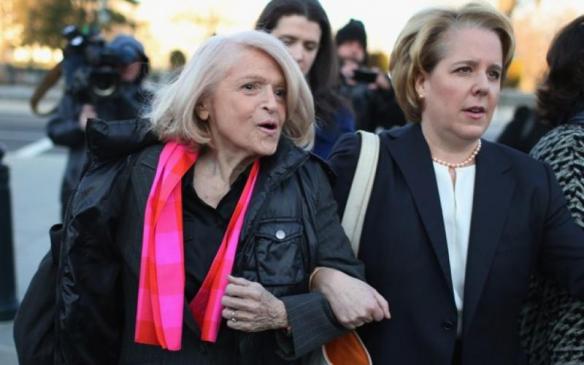Edith Windsor, Trailblazer for Same Sex Marriage, Comes to Nyack Through Film

by Harriet Cornell
If you Google “Edith Windsor,” these are some of the descriptive words found: Elegant. Regal. Champion of Change. Gladiator.
Edie Windsor was not a household name until June 26, 2013, when the Supreme Court of the United States rendered a decision in United States v. Windsor overturning discrimination to married same sex couples.
Edie and Thea Spyer had lived together for 40 years. Both were New York residents and were lawfully married in Canada in 2007. In 2008, New York recognized their marriage. Spyer died in 2009 at the age of 77, leaving her entire estate to Windsor who sought to claim the federal estate tax exemption for surviving spouses. She was barred from doing so by Section 3 of DOMA, the Defense of Marriage Act, which defined the term “spouse” as only applying to marriages between a man and woman. The IRS said the tax exemption did not apply to same-sex marriages, denied Windsor’s claim and compelled her to pay over $363,000 in estate taxes.
When I read about this landmark civil rights case and the stunning victory Edith Windsor won by fighting for equal treatment under the law, I was struck by her indomitable spirit. I nominated her for the “Trailblazer of Democracy Award” to be presented at the annual Eleanor Roosevelt Legacy luncheon on October 2, 2013 in New York City. 650 women and men turned out to support the work of Eleanor’s Legacy—recruiting, training, and funding pro-choice Democratic women running for public office. As Chair of the organization, I made the presentation to Edie.
A short history of the case: In 2010, Windsor sued the federal government in the U.S. District Court for the Southern District of New York, seeking a refund because DOMA had singled out legally married same sex couples for differential treatment, without justification. She was represented by Roberta (Robbie) Kaplan, an attorney with the firm of Paul, Weiss, Rifkin, et al which provided pro bono legal services to Edie. The District Court in June of 2012 ruled that Section 3 of DOMA was unconstitutional under the due process guarantees of the 5th Amendment, and ordered the federal government to issue the tax refund, including interest. The U.S. Court of Appeals affirmed that decision in October 2012.
An intervenor legal group (BLAG), which had been defending DOMA and arguing against Windsor, petitioned the U.S. Supreme Court to review the decision. In March of 2013, the Court heard oral arguments. On June 26, 2013, the Court issued a 5-4 decision declaring Section 3 of DOMA to be unconstitutional for depriving persons of liberties protected by the Fifth Amendment. The Court held that the constitution prevented the federal government from treating state-sanctioned heterosexual marriages differently from state sanctioned same-sex marriages.
Justice Anthony Kennedy authored the majority opinion, joined by Justices Ginsburg, Breyer, Sotomayor, and Kagan. It said, in part, that “DOMA seeks to injure the very class New York seeks to protect. By doing so it violates basic due process and equal protection principles applicable to the Federal Government. . . DOMA writes inequality into the entire United States code.”
Edie Windsor never set out to change the world. She was a woman whose loss and grief were compounded by extraordinary injustice, and she decided to fight back. After the decision, she issued a statement saying, “The truth is, I never expected any less from my country.”
This case had an impact within days of the decision. A federal judge asked the parties in a different case to explain why the logic that found DOMA’s section 3 unconstitutional did not apply equally to federal regulations that control eligibility for veterans’ spousal benefits, which define “spouse” as “a person of the opposite sex.” BLAG stated that in light of the Windsor decision, it would no longer seek to defend that case or similar statutes in court.
The Obama administration and executive departments and agencies, such as the Social Security Administration, began to extend federal rights, privileges, and benefits to married same-sex couples by changing regulations to conform to the decision in Windsor. Couples can file joint tax returns with the IRS, receive military benefits, and much more. A series of state and federal lawsuits have been filed against same-sex marriage bans and have affected other discrimination rulings.
When Edie Windsor, with Robbie at her side, accepted the Trailblazer of Democracy Award, the hall resounded with cheers and applause. Edie died last September at the age of 88. It’s up to us to insure that her belief in the ultimate fairness of the United States judicial system will hold true. Can there be any doubt of the importance of the Supreme Court in the life of these United States?
Harriet Cornell has been a Legislator since 1984 and was the first woman to chair the Rockland County Legislature, a position she held from January 2005 to December 2013.
To A More Perfect Union, directed by Donna Zaccaro, will screen Wednesday, September 26 at 8p at Nyack Center. Presented by Rockland County PRIDE, Rivertown Film and Legislator Harriet Cornell.
Donna Zaccaro will attend and speak at the screening. She will be joined after the film (63 minutes) for a discussion with Rockland residents Andrea Composto, President, Rockland County Bar Association; Eric Dea, advertising industry professional; and Christina Pratt, PhD, Professor of Sociology.
Donna Zaccaro is a filmmaker in Manhattan who was in the audience on October 2, 2013 when Harriet Cornell spoke about Edie Windsor and presented her with the “Trailblazer of Democracy Award.” According to Ms. Zaccaro, that sparked her interest and decision to create a film about Edie’s life and United States v. Windsor.








